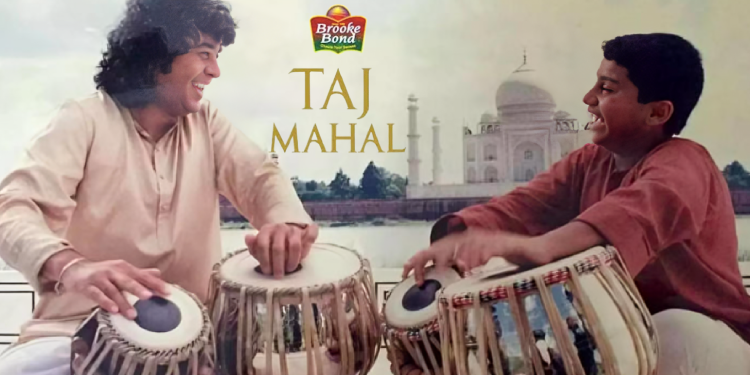The passing of Ustad Zakir Hussain, the legendary tabla virtuoso, has left a void in the world of music, but his influence endures across cultures and generations. While his unparalleled mastery over the tabla shaped the course of Indian classical music, it also played a pivotal role in transforming Indian advertising. One of the most iconic collaborations in the Indian advertising world was the partnership between Zakir Hussain and Brooke Bond Taj Mahal Tea, a bond that brought together the rich tradition of classical music and the craft of tea-making, leaving a legacy that still resonates today.
A Tea Brand’s Journey of Reinvention
Brooke Bond Taj Mahal Tea, launched in 1966 in Kolkata, was initially a premium product aimed at the upper crust of society. Known for its fine quality, the tea was associated with sophistication and exclusivity. Advertisements in the early years portrayed an elite lifestyle, often featuring models like Malavika Tiwari cycling and performing aerobics to emphasize a cosmopolitan image of tea drinking. The phrase “Ah, Taj” became synonymous with refinement, and mornings seemed incomplete without a cup of Taj Mahal Tea.
However, by the 1980s, the brand realized it had developed a significant following among the growing middle class. The challenge was to reposition the brand to communicate both exclusivity and accessibility, bridging the gap between aspirational middle-class consumers and the brand’s heritage of sophistication.
Research and Strategy: A Deep Dive Into the Tea Experience
Before launching its new campaign, Brooke Bond undertook in-depth research into what made Taj Mahal Tea stand apart. Agencies like Quantum and Hindustan Thompson Associates (HTA) delved into the key elements that would resonate with tea drinkers. They identified three essential qualities for any connoisseur: color, aroma, and taste. They also learned that the meticulous work of the tea taster—the individual who ensured the perfect blend—was central to the tea’s quality.
HTA’s creative team, led by strategic planner Dhiren Chaddha, sought to communicate this excellence and attention to detail through advertising that retained Taj Mahal Tea’s premium image while appealing to a broader Indian audience. The campaign needed a face—someone who could embody the brand’s values of perfection, precision, and mastery.
The Tabla Maestro: Zakir Hussain as the Perfect Brand Ambassador
At the crossroads of tradition and modernity, Zakir Hussain emerged as the ideal ambassador. As one of the world’s most renowned tabla virtuosos, Hussain was a symbol of discipline, artistry, and authenticity—qualities that aligned perfectly with the brand’s promise of perfection. His reputation as a classical music genius, combined with his global stature, made him the perfect choice to represent a product that celebrated Indian craftsmanship at its finest.
Zakir Hussain’s persona was far more than just that of a musician. He embodied a rare blend of indomitable skill and humble grace, which resonated with both the elite and middle-class audiences. His mastery over the tabla, an instrument demanding the highest level of precision and dedication, paralleled the painstaking process of creating the perfect cup of tea. The synergy between his craft and the tea-making process was undeniable, making him the perfect fit for Taj Mahal Tea.
The Iconic Commercial: A Masterstroke of Advertising
The commercial that cemented the bond between Zakir Hussain and Brooke Bond Taj Mahal Tea became a milestone in Indian advertising. Filmed against the majestic backdrop of the Taj Mahal, the ad featured Zakir Hussain immersed in the rhythmic beauty of his tabla performance. His fingers danced over the tabla, each beat striking with perfection, while a voiceover—delivered by the iconic Harish Bhimani—praised his artistry with the words, “Wah Ustad, wah!”
The brilliance of the commercial, however, lay in the way it merged two worlds: classical Indian music and tea. As Hussain finished his performance, he sipped a cup of Taj Mahal Tea. In response to the compliment, he famously replied, “Arey huzoor, wah Taj boliye!”—a clever and catchy play on words that drew a parallel between the perfection of the Taj Mahal, the precision of the tabla, and the meticulous process of making the perfect tea.
The line became an instant hit, and the commercial, with its fusion of music, culture, and branding, struck a deep chord with audiences. It was not only a tribute to the craftsmanship of Zakir Hussain but also a celebration of the heritage and quality that Taj Mahal Tea promised.
Cultural Impact and Lasting Legacy
Zakir Hussain’s association with Taj Mahal Tea helped elevate the brand, making it a household name across India. His involvement in the campaign brought him into the living rooms of millions who may have only known him through his performances or the radio. His connection to the brand made classical music more accessible to everyday consumers, further solidifying his stature as a cultural ambassador.
The commercial’s success also set the stage for future campaigns that continued to celebrate classical music and Indian craftsmanship. Taj Mahal Tea’s legacy was further cemented with initiatives like the Taj Mahal Tea House sessions, which created platforms for live performances and deepened the brand’s association with music. Over the years, the brand has featured other classical musicians such as Pt. Niladri Kumar and Pt. Rahul Sharma, further strengthening its connection to India’s rich musical heritage.
The Evolution of the Brand
Today, Taj Mahal Tea continues to be one of India’s most cherished tea brands, retaining its aura of exclusivity while appealing to a wide audience. The brand has evolved with the times, embracing modernity without losing sight of its roots. The legacy of the Zakir Hussain campaign remains a hallmark of the brand’s journey, a testament to how a product, a maestro, and a timeless idea can come together to create a moment of lasting cultural significance.
As we mourn the passing of Ustad Zakir Hussain, it’s essential to remember that his influence extended far beyond the concert stage. His work with Taj Mahal Tea not only introduced millions to the beauty of classical music but also redefined how brands could connect with audiences on an emotional and cultural level. His legacy lives on in the rhythms of his tabla and in the cups of Taj Mahal Tea enjoyed by generations of tea drinkers.
In a world where branding often relies on fleeting trends, the collaboration between Zakir Hussain and Taj Mahal Tea stands out as an enduring example of how tradition, artistry, and craftsmanship can shape a brand’s identity. Their romance, born out of a shared commitment to excellence, continues to resonate with generations of tea drinkers and music lovers alike, making it one of the most iconic partnerships in Indian advertising history.
Zakir Hussain’s passing marks the end of an era, but his remarkable legacy, both in the world of music and in his memorable connection with Taj Mahal Tea, will continue to inspire for years to come.

















